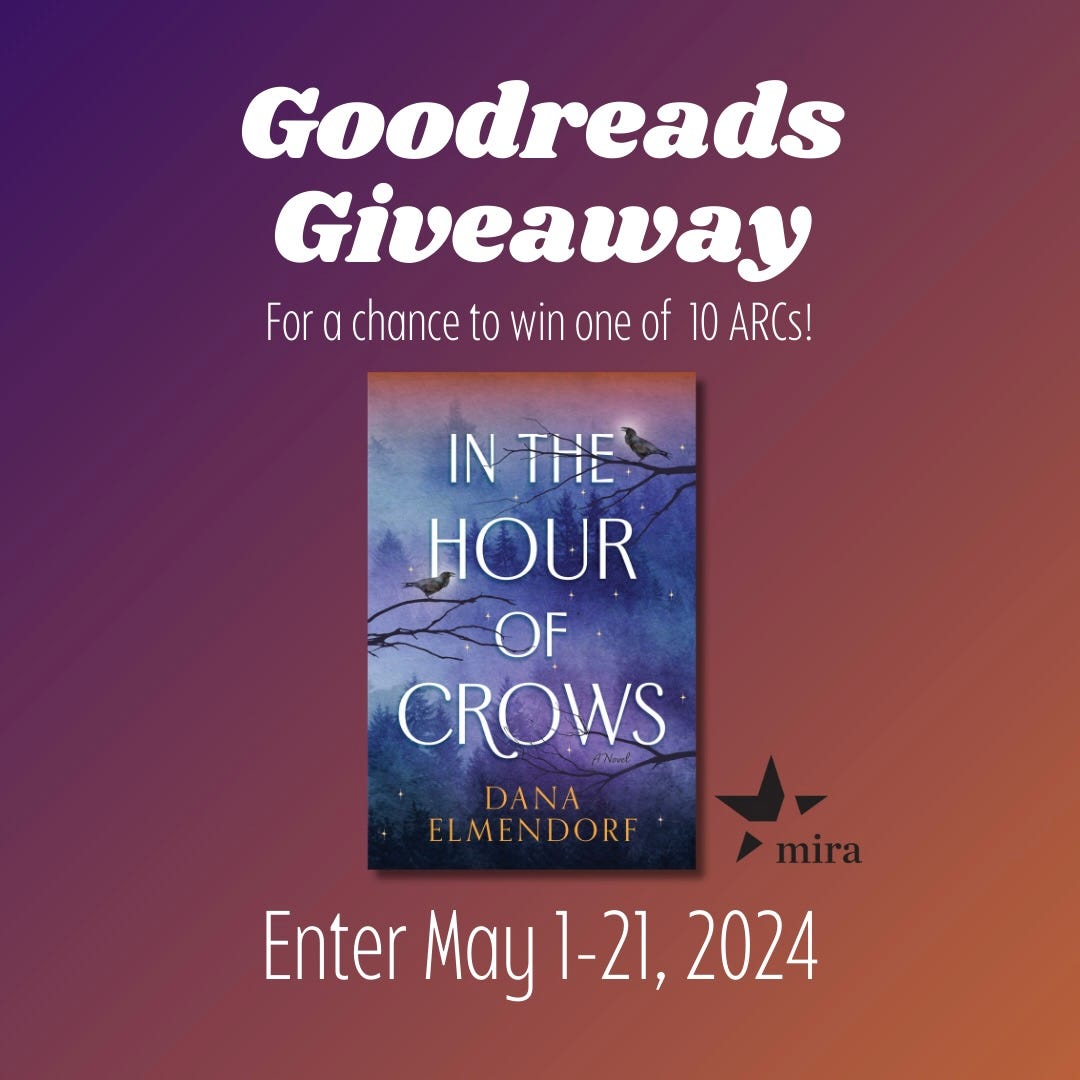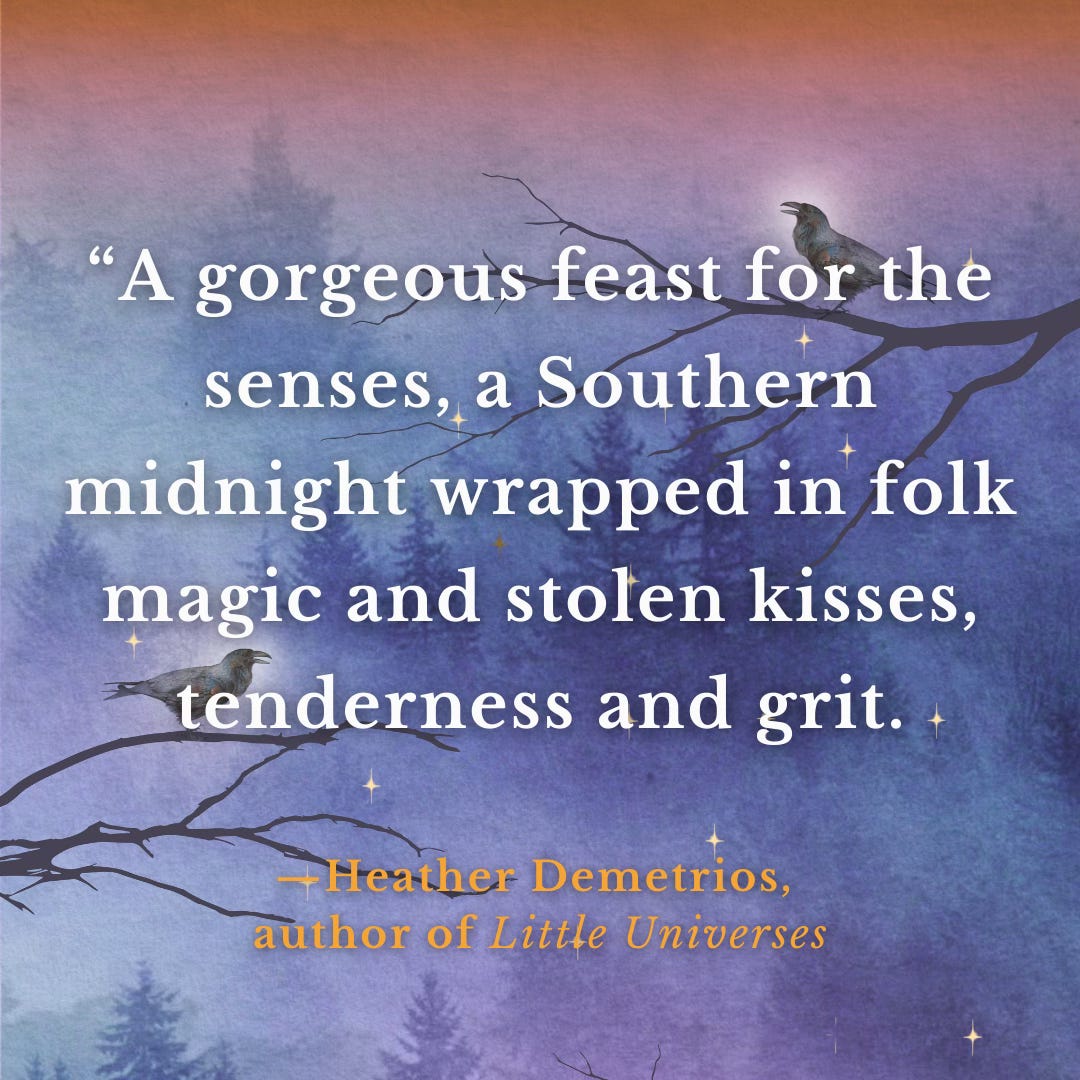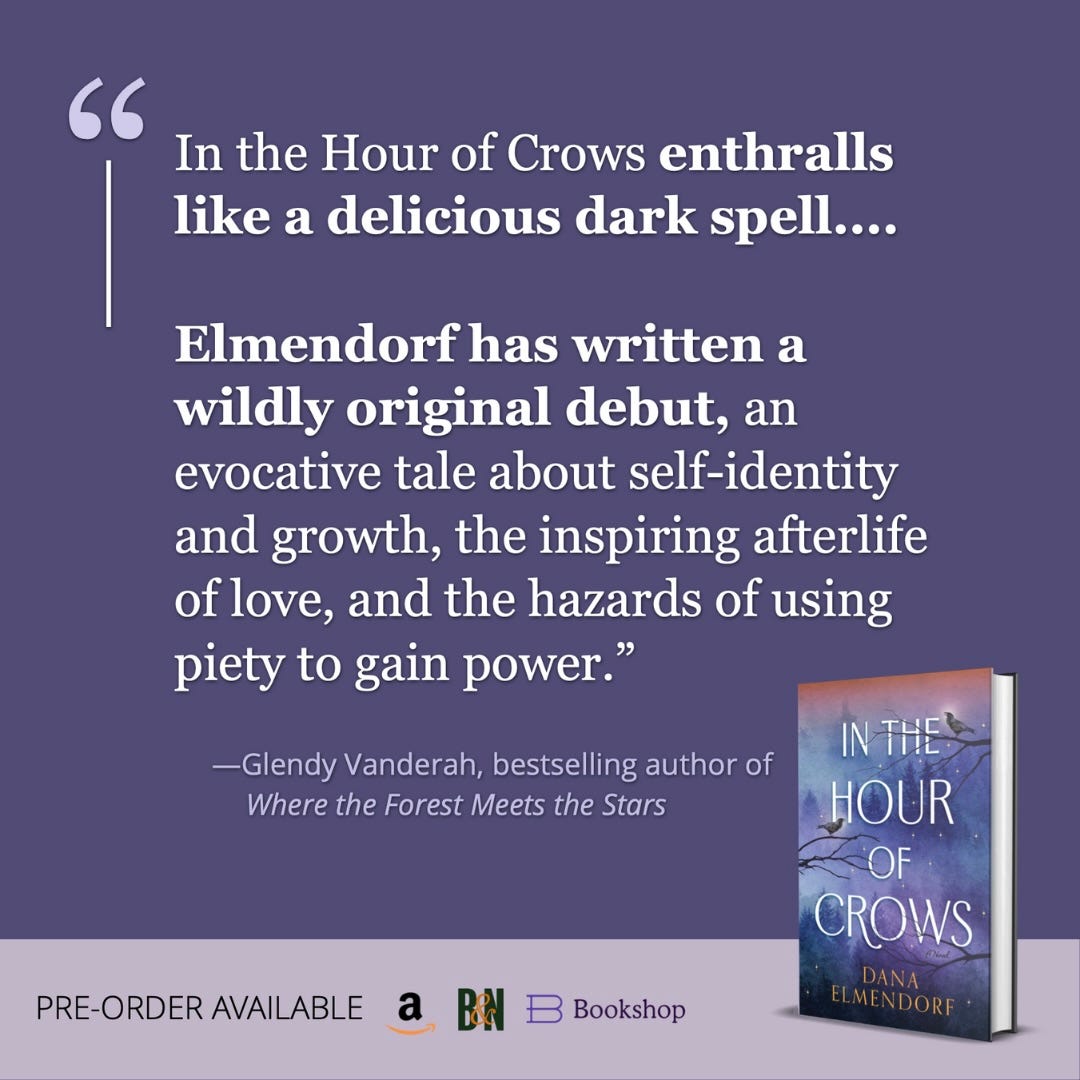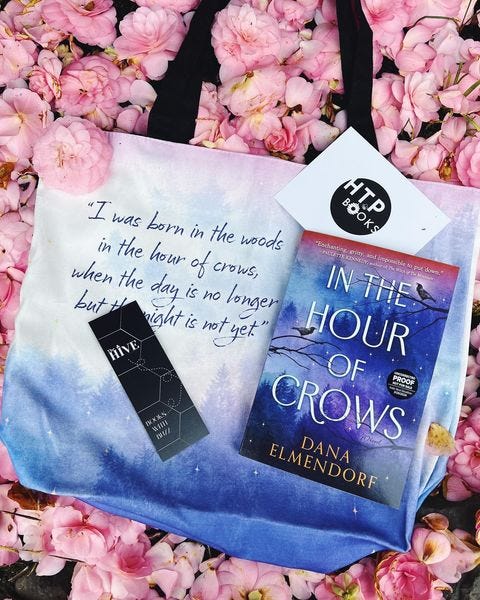👀 An Inside Look at Working with a Writer’s Coach
And I sold another book!
It’s May 4th, y’all! WE ARE ONE MONTH AWAY UNTIL MY BOOK RELEASE! June 4th is almost here, and I have SO much good news to share with you guys. First off, I SOLD MY NEXT BOOK!!! Here’s my deal announcement:
You’ll hear more about this book in the coming months, but it’s very exciting that I get to keep working with my publisher and my editor. They have been a dream. And in case you didn’t know, here’s your last chance to win an ARC in my publisher’s Goodreads giveaway.
But that’s not what you came here for, so let’s get to the good stuff. EVERY time I sit down to write this newsletter I say to myself, “I ain’t gonna writer a dissertation this month.” Then I have so much to say it’s going to take y’all a month to read this. So go grab a snack and warm up your coffee, you might be here a while. (And if you get bored along the way, DNF this mother f*cker and read something useful. You won’t hurt my feelings. Hell, I won’t even know!)
My Writing Journey
AN INSIDE LOOK AT WORKING WITH A WRITER’S COACH
I attribute my recent success in publishing to my time working with a writer’s coach. To define “success,” I should probably give you a little background into my publishing career. Fifteen years ago I started writing as a hobby (2009). After a couple of years and multiple, terrible books later, I wrote something that was pretty decent (2012). It got me an agent (2013), and we went on to sell it to a small publisher (Albert Whitman, 2014) for a small advance (less than $5K) and in 2016 my YA debut South of Sunshine was published. Fast forward seven years later (2023), where I sold my second novel, my adult debut, In the Hour of Crows, at auction for six figures to a big publisher (Mira books with HarperCollins.) I call that a success. And, as you saw above, I sold my next book in a good deal so I think what I’m doing is working. Let’s get to it.
Good Lord, y’all, I made SO MANY changes over those seven years: got rid of some “friends” that were holding me back, cycled through two agents, shifted from contemporary romance to gothic fiction, and I exited the YA world entirely and stepped into adult fiction. While all of those changes effected my career, it wasn’t until I leveled-up my writing skills, through my writer’s coach, did I finally get the career I had always wanted.
It's work, y’all. Not gonna lie. My biggest first step…I had to admit my writing and storytelling was mediocre. Yep. That doesn’t mean I wasn’t a good writer, it just meant I was average. I don’t think most writers can admit that, so they plateau in their career or become stagnant. Now look, of course you can take writing classes, attend writer conferences, or go on writing craft retreats to advance your writing skills. Those are great options. But there is something powerful about working one-on-one with a writer’s coach. It’s not just about learning craft. It’s about understanding your specific writer brain and how it digests knowledge, then rewiring what you know to maximize your skill.
HOW DID IT START
Honestly, I felt lost and deflated. I had written several books after my first novel, switched genres, changed agents but nothing seemed to shift my career significantly. I felt like I was floundering, walking around in the dark, feeling my way through my writing. Everything I wrote felt flat. And that’s when I stumbled onto one of Heather Demetrios’ Instagram posts. (She’s a YA author, and I loved her I’ll Meet You There YA romance.) She was promoting one of her writer’s coach sessions. I wasn’t sure what coaching was about, but she seemed like a legit person, not trying to scam people, so I reached out and asked about her services. The awesome part, she had (and still has) several different types of services at different levels.
It started with an email inquiry. Then a 20 minute phone call to see if we would work well together—I knew instantly we would be a great team. I started with one of her smaller packages (month-to-month.) We communicated through phone calls, emails, and voice messages on WhatsApp. Then I upgraded to her six month premium package. I know what you’re thinking, How much does that cost? It’s not cheap, but it’s not horrifically expensive. (She’s very upfront with her rates on her website, so you can go look for yourself. She also offers tons of free workshops, so sign up for her newsletter, too.)
One of the incredible things about working with Heather is when I didn’t get what she was trying to help me with, she’d try a different method or different way to explain it. Here’s what I learned, hopefully my experience will help you out as well.
WHAT DID I LEARN
My first call with her, I didn’t know what in the hell a writer’s coach even did or what I wanted from her or how she could help me or hell, I didn’t know what was even wrong with me to begin with. So she simply asked me one question: what I wanted out of my career? I told her I wanted an agent and a big book deal, specifically I wanted to sell a book at auction to a big publisher. (That’s what I did in the end. Self-manifestation is powerful.) As you can imagine, she lassoed me back to Earth and walked me back from BIG DREAM to the baby steps it would take to get there. Which of course meant I had to focus on my writing. But look, y’all, I was pissed about those baby steps, I wanted to skip to the next part already. But I kept telling myself, DO WHAT YOU HAVE TO DO to get an agent and a big book deal. My plan, I was NOT going to stop until I got what I wanted. I refused to let that fire die inside me. It was my daily fuel, so much so sometimes it got in my way. But I refused to let it go.
ASSIGNMENTS
My teenage son was like, “I can’t believe you actually pay someone to give you homework.” lol. Well, it’s true. But craft and writing assignments were the smallest portion of our work together, but they were important. Each week we talked about what I was struggling with in my writing. And it seemed like every week it was something new. It was almost like I had forgotten EVERYTHING I’d ever learned about writing. She had a plethora of resources she shared with me that helped me through. Here are some of the assignments we worked on:
Worked on Character Desire – She taught me how to map out my character’s desires by studying popular books and tracking the character’s desire, misbeliefs and wants. Eventually I was able to do that for my own characters.
Read Like a Writer – This is where I reread books I loved, that were similar to what I wanted to write. She had me dissect what parts I loved, why I loved those parts, and how the author achieved it. Then I was to compare to my own writing and look at what was missing.
How to Unlock My Plot – How to use objectives and obstacles to move a chapter along. How to string chapters together with profluence (momentum and flow that moves the story forward.)
But the biggest part of my growth came when she dissected my writer brain.
THE WRITING PSYCHE
A good portion of our time together was working through my writer psyche. As writers we get in our own way most of the time.
Finding psychic distance from your story can be so powerful. Write the words, walk away, and give yourself time and distance before you look at them again. You gain so much clarity from doing so. I’m sure you’ve heard that before, but do you actually do it? And if you have but you didn’t really gain any clarity on how to do things better, then either one, give it more time. Or two, you might need to shelf that story. You’re either too close to it or you’re not the writer you need to be yet to make that story great. Cut your losses and move on. Too many times I see writers who keep going back to old stories, trying to give them new life. Most of the time all you’re doing is shuffling around words and throwing in a handful of new ones, and hoping that will do the trick. It won’t. How do I know that? Because that’s what I did, too. They are not wasted words, you learned something writing that book. Now use that new knowledge and write something better.
Fill the creative well. You can’t keep demanding your brain to give you gold if you’re not feeding it. That doesn’t mean go binge-watch a series on Netflix. It means turning your mental focus on something that brings joy and inspiration to your writing. Maybe that means go paint or draw, visit a museum, read something you love, connect with nature, play an instrument, etc. For me it meant: refinish a piece of furniture, redesign rooms with Pinterest, make jewelry, and organize spaces in my home. Do what you love and do it often. If you don’t have a full heart and joy, you can’t write something great. Unless you’re going through a horrifically shitty breakup and you pour all that emotion into a book. Seriously, when artists are emotional wrecks they write the greatest stuff. Look at T-Swifty! She’s made billions off a broken heart. Okay, moving on.
End of the month reflection – Did you get your shit done like you were supposed to this month? Or did you f*ck around all month and only gave it a half-ass effort? Don’t lie to yourself. Do you want that big book deal or what? Look, your momma isn’t around to make you clean your room. Nobody is going to hold you accountable. That’s on you, boo. So how do you do that? At the end of each month (or each week, whatever works better for you) evaluate your progress. What were your successes? What would you like to improve on? How do you need to adjust going forward? Taking the time to look over how you’re progressing keeps you focused and aligned. Staying on track is important and having that accountability is powerful.
(Look at you, you’re half way through reading this! Almost done. Keep going! You’ve got this. Also, I have news about an upcoming giveaway at the bottom as a reward. Here’s a beautiful blurb about my book to break up all this text. Jesus.)
WRITING PROCESS
THIS RIGHT HERE was the most powerful thing I learned. Know your writing process. It’s the key to finding flow. Flow is when the writing is prolific: when the words are flowing fast and furious, the ideas are strong, and the next thing you know you’ve written 3-4K in a single day. Damn, I love those days. I know the muse feels like an elusive, fickle thing, but honestly, it’s not. You just need to identify your writing process and the muse will show up every time…or at least 95% of the time.
First, you need to know the difference between writing process and writing routine. Writing routine are the actions you do when you sit to write: grab coffee, light a candle, shut out all noise (or turn on music—you do you), butt in chair, stare at the computer until the words start to flow. Writing process is what you do so the writing is prolific.
How do you find your own writing process? Reflect back and ask yourself what happened on those days you were prolific? Did you see something that inspired you? Did you hear a great song and all you could think about was your story? Did you sit quietly with your thoughts and let yourself day dream? Identify the thing(s) that helps you get the words on page. It may vary at times, but create a list that you can readily grab and pick the thing that gets you most excited and curious about your story and go. There are lots of parts to my writing process, but these are a few big ones Heather helped me discover:
IMAGERY – I’m a visual person by nature. And sometimes an image just speaks to me. It fuels some inspiration for a story idea or a scene. A book aesthetic is key to my writing success. Whenever I feel the words aren’t flowing, a strong visual can really get my fingers itching to write. One of the exercises she had me do was close my eyes, sit on the floor of my character’s room and describe what you see. From that imagery exercise alone, I created a vital piece to my upcoming story. I saw a cobalt blue perfume bottle with a stopper that did not match. (I don’t know why that little detail mattered, but it did.) And I was like, what is that used for? I imagined it was a bottle that she kept a poison in. What if when she talked the death out of someone she coughed up a thick black ooze? A death ooze. NO…Sin Eater Oil. That became a huge part of my magic system. It shaped who her grandmother was. It became a pivotal piece to my story and so much more.
QUIET THE MIND – I need quiet to write, but I also need quiet to think. Which means hours on end with no noise. No talking. No TV. No podcasts. No music. No people. Whether I’m in my car, at home, out and about…no noise. It’s in the silence that I find my story.
WRITE IT WRONG – This was the hardest part of my process to accept, because it felt like wasted words. But sometimes I just have to write it wrong to get it right. It’s something Anne Lamont speaks about in her book Bird by Bird. It’s not wasted time or wasted words if it gets you the story you were meant to tell. For my upcoming debut, In the Hour of Crows, I rewrote it, mostly from scratch, THREE TIMES. Dear God, that was sheer misery. But the story wasn’t right,. and I knew it in my gut so I did the unthinkable and started over. I only kept 25% of the story each time. I have a cuts document, and this book I have about 125,000 words in that document. That’s two short novels! Holy Jesus. But that’s what it took to get this book right. You’ve got to be willing to do the thing you don’t want to do to get to the place you’ve never been.
READ OTHER PEOPLE’S WORDS – When I read books by authors whose writing is similar to mine, it gets me excited to write my own story. Other people’s delicious words can be inspirational. Even if that means rereading your favorite stories that are similar to what you want to write. When I read a book I underline lines I love. And sometimes I go back and reread those lines to light a fire in me.
If you want flow, you need to be excited to write. Knowing your writing process can set yourself up for success.
TRUST YOUR GUT
This is a pretty invaluable tool that my writer’s coach taught me. It seems simple enough, but it’s much harder to put into practice. As humans, we tend to accept the negative we tell ourself five times more often than the positive. You KNOW when you write something amazing. It exciting when your words sing on the page! Those scenes barely need revising as you work through your drafts. When you know, you know. And adversely, you know when you write something terrible. The dread of revising it, the self-loathing you feel, ugh…it’s the worst. And you know when you’re writing in the wrong direction. You know! Now you just need to trust when your gut is telling you this.
How do you read your gut? Here’s a test that Heather taught me. Try the body test. Think of a phone call you are dreading to make with a person you just don’t like, and you need to talk about something you never want to discuss. Now, how does that feel in the body? Is your stomach in knots? Do you feel yourself tighten? Where do you feel that negativity in your body? That’s how I feel when I write something I know isn’t good enough. Now try the opposite. Think of a beautiful day in your life where you got to do something with your favorite person. Does your body feel light? Are you smiling? Do you have a fluttery feeling of excitement in your stomach? Is your heart bursting with joy? That’s exactly how I feel when I write something great!
WHO SHOULD HIRE A WRITER’S COACH
(Dear Lord, is she almost done telling this story? ALMOST! I swear.) I’m sure most of you think writer’s coaches are for beginners, for people who don’t really know what they are doing yet. And while I think a writer’s coach could benefit a beginner, I think seasoned writers would benefit the most. If you’re a published writer who’s been in the game a while, published several books but now you find yourself in a writing slump, you just might need a writer’s coach. Hiring a writer’s coach doesn’t mean you’re a bad writer. Hiring a writer’s coach means you recognize you want something more out of your writing and need that extra boost to get you to the next level. But here’s a secret, my writer’s coach didn’t simply help me get to the next level, she helped me advance SEVERAL levels. I think my publishing record speaks to that.
HOW TO FIND A WRITER’S COACH
While I can’t tell you where to look for a writer’s coach, because I stumbled onto mine, I can tell you what to look for. Ask for testimonials. Ask to speak with past clients. Ask questions: what to expect, how much, what materials will we work with. Have a brief phone call to see if you’re a good fit.
WAS IT WORTH IT?
Every penny. As a matter of fact, I’ve recently hired her again, to unf*ck my brain while I’m working on this next manuscript. The best way to describe working with a writer’s coach, my writer’s brain was a giant ball of Christmas lights and she just helped me untangle it.
Here’s the thing though, it only works if you put in the work. You get out what you put in. I put every ounce of my soul into my work with my writer’s coach. And it paid off big-time for me. I was working with her when I wrote (and rewrote from scratch 3 times) my adult debut, In the Hour of Crows. I contribute my success with that book from our time working together.
If you’d like to learn more about my writer’s coach, Heather Demetrios, and what she has to offer, go to HeatherDemetrios.com for more information. Or find her here on Substack as Lotus and Pen.
Bookish News
Look at these two new blurbs that came in this past month!
What I’m Loving Right Now…
This custom tote my publisher made for my book! Isn’t she gorgeous!
Would you like to win this tote and an ARC?! Stay tuned because Monday I’ll post a giveaway on my Instagram on how you can enter for a chance to win one. And all my newsletter subscribers get an extra entry! (Lucky, you. 😏)
Holy smokes! You made it to the end. You’re like my favorite person right now. XO Thanks for reading! Now go reward yourself with a cookie or a book or whatever it is that makes you smile. I have no idea what I’m going to write about next month, but I’ll try not to make it the Declaration of Independence the next time…no promises though. But do expect a couple of more newsletters from me this month with book news and giveaways. Later gator!
xo,
Dana









